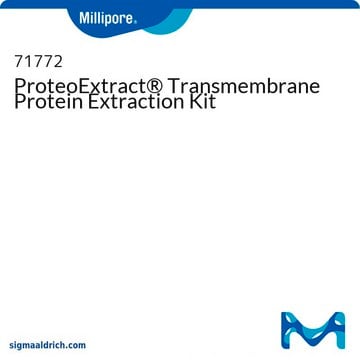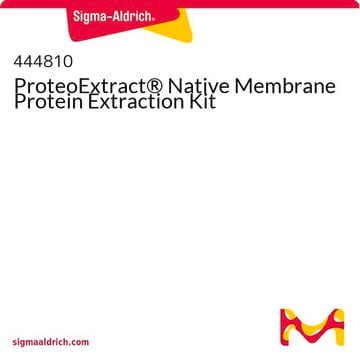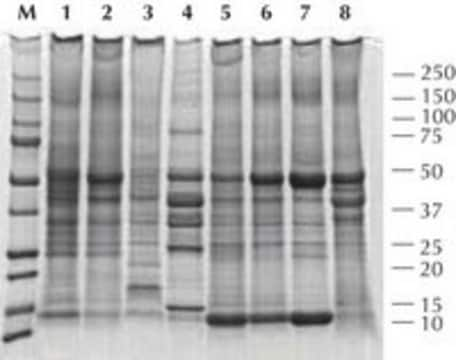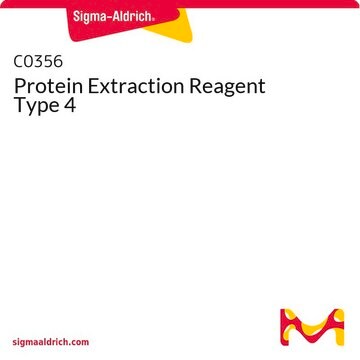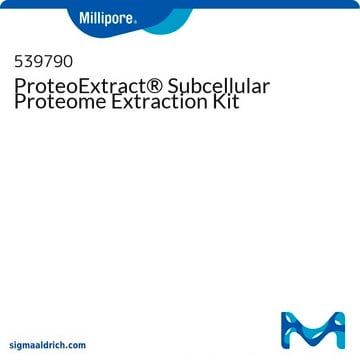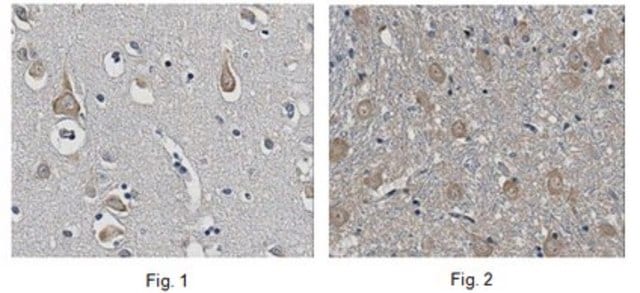Alle Fotos(1)
Wichtige Dokumente
CE0050
CelLytic™ MEM Protein Extraction Kit
Synonym(e):
Membrane protein extraction kit
Anmeldenzur Ansicht organisationsspezifischer und vertraglich vereinbarter Preise
Alle Fotos(1)
About This Item
UNSPSC-Code:
41116134
NACRES:
NA.56
Empfohlene Produkte
Allgemeine Beschreibung
CelLytic™ MEM Protein Extraction Kit offers a fast and convenient method to isolate hydrophobic and raft microdomain associated proteins from cells. The method is based on phase separation and does not require cell membrane isolation. The separated proteins can be used for further experiments such as SDS-PAGE, Western blotting, dot blotting, and immunoprecipitation. The kit has been tested on, but not limited to, HeLa, HEK-293, NIH 3T3, COS and CHO cell lines.
Membrane proteins make up around 20-30% of an organism′s genome and serve as cellular gatekeepers, regulators, and sensors. They have diverse cellular functions, such as shielding the cell from external toxins, being the starting point of intracellular signaling cascades, and retaining critical ion concentrations.
Anwendung
CelLytic™ MEM Protein Extraction Kit has been used for de novo lipogenesis measurements using hepatocytes and to extract membrane proteins for western blotting.
Eignung
Sufficient reagents supplied for 80 tests.
Rechtliche Hinweise
CelLytic is a trademark of Sigma-Aldrich Co. LLC
Nur Kit-Komponenten
Produkt-Nr.
Beschreibung
- Lysis and Separation Buffer 50 mL
- Wash Buffer for CelLytic MEM 50 mL
- Sodium Chloride, 4M Solution 1.5 mL
Kit-Komponenten auch einzeln erhältlich
Produkt-Nr.
Beschreibung
SDB
- P8340Protease Inhibitor Cocktail, for use with mammalian cell and tissue extracts, DMSO solution 1 mLSDB
Signalwort
Warning
H-Sätze
Gefahreneinstufungen
Eye Irrit. 2 - Skin Irrit. 2
Lagerklassenschlüssel
10 - Combustible liquids
Flammpunkt (°F)
188.6 °F - closed cup
Flammpunkt (°C)
87 °C - closed cup
Analysenzertifikate (COA)
Suchen Sie nach Analysenzertifikate (COA), indem Sie die Lot-/Chargennummer des Produkts eingeben. Lot- und Chargennummern sind auf dem Produktetikett hinter den Wörtern ‘Lot’ oder ‘Batch’ (Lot oder Charge) zu finden.
Besitzen Sie dieses Produkt bereits?
In der Dokumentenbibliothek finden Sie die Dokumentation zu den Produkten, die Sie kürzlich erworben haben.
Kunden haben sich ebenfalls angesehen
Jun Yang et al.
Bioscience, biotechnology, and biochemistry, 83(6), 1117-1123 (2019-03-08)
It has been reported that lncRNA POU3F3 was upregulated in esophageal squamous-cell carcinomas, indicating its role as an oncogene in this disease. However, the mechanism of its function and its involvement in other malignancies is unknown. In the present study
Yue Zhao et al.
Cancer medicine, 7(8), 3977-3987 (2018-07-06)
Esophageal squamous cell carcinoma (ESCC) is a malignant disease with poor prognosis. Because of early metastasis prior to diagnosis and therapeutic resistance, ESCC has become one of the leading causes of cancer-related death. Here, we investigated the clinicopathological significance of
Tomoaki Furuta et al.
Cancer science, 112(9), 3722-3731 (2021-06-12)
The rBC2LCN lectin, known as a stem cell marker probe that binds to an H type 3 fucosylated trisaccharide motif, was recently revealed to also bind to pancreatic ductal adenocarcinoma (PDAC) cells. A lectin-drug conjugate was generated by fusing rBC2LCN
Willy Morelle et al.
The Journal of clinical endocrinology and metabolism, 102(4), 1375-1386 (2017-03-23)
TMEM165 deficiency is a severe multisystem disease that manifests with metabolic, endocrine, and skeletal involvement. It leads to one type of congenital disorders of glycosylation (CDG), a rapidly growing group of inherited diseases in which the glycosylation process is altered.
Hiroaki Tateno et al.
Glycobiology, 26(12), 1328-1337 (2016-04-03)
Human somatic stem cells such as human mesenchymal stem cells (hMSCs) are considered attractive cell sources for stem cell-based therapy. However, quality control issues have been raised concerning their safety and efficacy. Here we used lectin microarray technology to identify
Unser Team von Wissenschaftlern verfügt über Erfahrung in allen Forschungsbereichen einschließlich Life Science, Materialwissenschaften, chemischer Synthese, Chromatographie, Analytik und vielen mehr..
Setzen Sie sich mit dem technischen Dienst in Verbindung.

